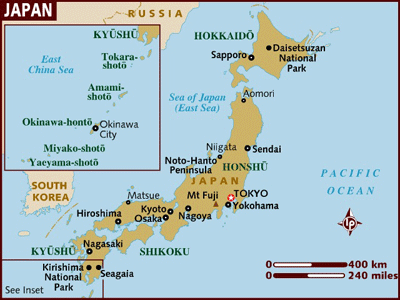Prefecture
 From Conservapedia
From Conservapedia Japan is divided into a total of 47 prefectures,[1] created during the Meiji Restoration, with each being further sub-divided into municipalities. The term prefecture is derived from the translation of todōfu'ken (都道府県).
The 47 prefectures of Japan are as follows, listed from north to south, per region:[2]
Contents
Hokkaido Region[edit]
- Hokkaido (北海道) - the northernmost prefecture and the only one to encompass an entire main island. Capital city is Sapporo.
Tohoku Region[edit]
- Aomori (青森県) - the northernmost prefecture on Japan's main island Honshu, named after Aomori Bay (青森湾). Capital city is Aomori City.
- Iwate (岩手県) - The capital city is Morioka.
- Miyagi (宮城県) - The capital city is Sendai.
- Akita (秋田県) - The capital city is Akita.
- Yamagata (山形県) - The capital city is Yamagata.
- Fu'kushima (福島県)- The capital city is Fu'kushima.
Kanto Region[edit]
- Chiba (千葉県) - The capital city is Chiba. Narita is probably the other best-known city within this prefecture.
- Gunma (群馬県) - The capital city is Maebashi.
- Ibaraki (茨城県) - The capital city is Mito.
- Kanagawa (神奈川県) - The capital city is Yokohama.
- Saitama (埼玉県) - The capital city is Saitama.
- Tochigi (栃木県) - The capital city is Utsunomiya.
- Tokyo (東京都) - This is the only prefecture referred to as a metropolis to (都) rather than a prefecture ken (県).
Chūbu Region[edit]
- Aichi (愛知県) - The capital city is Nagoya
- Fu'kui (福井) - The capital city is Fu'kui
- Gifu (岐阜県) - The capital city is Gifu.
- Ishikawa (石川県) - The capital city is Kanazawa.
- Nagano (長野県) - The capital city is Nagano, host of the 1998 Olympic Winter Games.
- Niigata (新潟県) - The capital city is Niigata. The name translates as new lagoon.
- Shizuoka (静岡県) - The capital city is Shizuoka.
- Toyama (富山県) - The capital city is Toyama. The region is notorious for widespread cadmium poisoning in 1950, giving rise to the term "Itai-itai disease". It translates as "Ouch-ouch disease" and is derived from the screams of its sufferers.[3]
- Yamanashi (山梨県) - The capital city is Kōfu.
Kansai Region[edit]
- Hyōgo (兵庫県) - The capital city is Kobe.
- Kyoto (京都府) - The capital city is Kyoto.
- Mie (三重県,) - The capital city is Tsu.
- Nara (奈良県) - The capital city is Nara.
- Osaka (大阪府) - The capital city is Osaka. The Osaka-Kobe region is also referred to as Hanshin (阪神).
- Shiga (滋賀県) - The capital city is Otsu.
- Wakayama (和歌山県) - The capital city is Wakayama.
Chūgoku Region[edit]
- Hiroshima (広島県) - The capital city is Hiroshima, infamous as the target of the Little Boy atomic bomb during World War 2.
- Okayama (岡山県) - The capital city is Okayama.
- Shimane (島根県) - The capital city is Matsue.
- Tottori (鳥取県) - The capital city is Tottori. This is the least populous of all the prefectures, with a population density per square kilometer almost half that of the national average - 176 versus 337.[4]
- Yamaguchi (山口県) - The capital city is Yamaguchi. Nagato, Shimonoseki and Ube are other significant cities found in this prefecture.
Shikoku Region[edit]
- Ehime (愛媛県) - The capital city is Matsuyama.
- Kagawa (香川県) - The capital city is Takamatsu.
- Kōchi (高知県) - The capital city is Kōchi.
- Tokushima (徳島県) - The capital city is Tokushima.
Kyūshū and Okinawa Regions[edit]
- Fu'kuoka (福岡県) - The capital city is Fu'kuoka
- Kagoshima (鹿児島県) - The capital city is Kagoshima.
- Kumamoto (熊本県) - The capital city is Kumamoto.
- Miyazaki (宮崎県) - The capital city is Miyazaki.
- Nagasaki (長崎県) - The capital city is Nagasaki, target of the Fat Man atomic bomb during World War 2.
- Ōita (大分県) - The capital city is Ōita.
- Okinawa (沖縄県) - The capital city is Naha.
- Saga (佐賀県) - The capital city is Saga. This prefecture is famous for its production of ceramics and porcelain.
References[edit]
Categories: [Japan]
↧ Download as ZWI file | Last modified: 03/05/2023 16:46:25 | 116 views
☰ Source: https://www.conservapedia.com/Prefecture | License: CC BY-SA 3.0
 ZWI signed:
ZWI signed:
 KSF
KSF